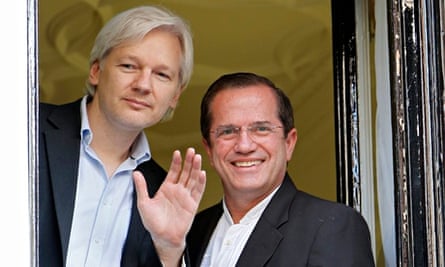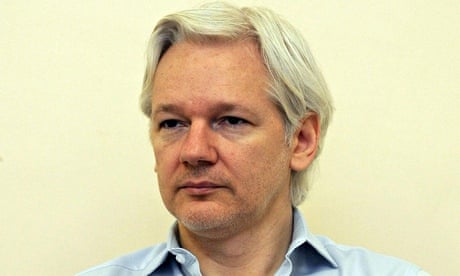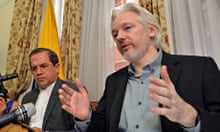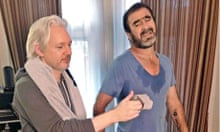Ecuador's foreign minister has accused the British government of having no real interest in finding a diplomatic solution to the confinement of Julian Assange, the WikiLeaks founder who has spent more than two years in the country's embassy in London.
Ricardo Patino told the Guardian that he believed the UK was violating Assange's human rights by refusing to allow him to leave the building without fear of arrest.
"I do not think there is a will [in Britain] to find a solution," Patino said, acknowledging that without a political or legal breakthrough Assange could spend years living in a handful of tiny rooms at the country's small west London embassy.
"The British government hasn't taken any steps in that direction. We have made proposals, we have submitted documents, and all we have seen on the part of the British government is an increase in security to make sure Julian Assange does not leave the embassy, but there has been no political will or any steps taken towards a diplomatic solution to this.
"Everyone around the world knows that the rights of Julian Assange have been violated."
Assange, 43, has not set foot outside Ecuador's embassy since June 2012, after seeking political asylum to avoid extradition to Sweden to face allegations of rape and sexual assault made by two women.

The anti-secrecy campaigner, who denies the accusations, fears he is at risk of onward extradition to the US to face as yet unspecified charges relating to WikiLeaks publications, a concern which prompted the Latin American country to grant him asylum status.
With the Swedish courts last month rejecting an attempt by Assange's lawyers to quash the warrant for his arrest, Britain continuing to insist he will be arrested the instant he steps foot outside the building and the Australian refusing to budge, the situation has now reached political and legal deadlock. British police maintain a 24-hour presence outside the embassy, at a total cost to date estimated at more than £7m.
The foreign minister's comments followed reports on Sunday sourced to WikiLeaks insiders that suggested Assange is suffering from a potentially life-threatening heart condition, has a chronic lung condition and dangerously high blood pressure.
The anonymous comments appeared in a Mail on Sunday interview with Assange in which he made no explicit mention of his health, saying only "I can't even keep a pot plant alive for long in here."
Ecuador has asked Britain to allow Assange, in the event of a medical emergency, to be taken to hospital in a diplomatic car without risk of arrest, but the request was refused, said Patino.
In an interview with the Guardian conducted in London at the residence of the Ecuadorian ambassador Juan Falconi Puig, the foreign minister said he was not at liberty to discuss Assange's health, "but if you ask a doctor what happens to someone who has been locked in a place for two years who has not been allowed to get some fresh air ... obviously this will have a physical and psychological impact which we will have to see."
In a separate article written for the Guardian on Monday, Patino writes: "We are concerned about the consequences of an eventual medical emergency without access to hospital facilities or care. The United Kingdom and Sweden should consider whether they are willing to assume such consequences." Patino met the then foreign minister William Hague in June last year, after which the two governments agreed, according to a Foreign Office statement at the time, to "establish a working group to find a diplomatic solution to the issue of Julian Assange".
But Patino said that "different interpretations of the decisions we had taken with William Hague" had led to the group never being established. Rather than being frustrated, the foreign minister said he was "disappointed that countries that [claim] to defend freedom, speak up for human rights, who have taken part in many wars and invasions alleging that the reason in freedom and human rights, in this case, when you are talking [about] the freedom of expression of one person, they do the opposite." He would not have time to meet the foreign secretary, Philip Hammond, on this trip, having come to meet Assange and his advisers.
Ecuador has said it may seek to prosecute the UK in the international court of justice, the United Nations court of arbitration between states, if Britain does not agree to grant Assange safe passage to Ecuador, something the foreign minister said was still being considered. "There are international legal instruments which have the agreement of both Ecuador and the British government as well as the Swedish government which would allow the government of Ecuador to take legal action," he said.
In his interview on Sunday, Assange spoke of missing his children, mother and grandmother, and said his stepfather and grandfather had died during his time in the embassy. "I said when I got out of prison [in 2010] I had enough anger to last me 100 years and 100 years has not passed yet, but that anger also acts as useful fuel to get work done," he told the newspaper.
The Foreign Office said in a statement: "We remain as committed as ever to reaching a diplomatic solution to this situation. We are clear that our laws must be followed and Mr Assange should be extradited to Sweden. As ever we look to Ecuador to help bring this difficult, and costly, residence to an end."









Comments (…)
Sign in or create your Guardian account to join the discussion